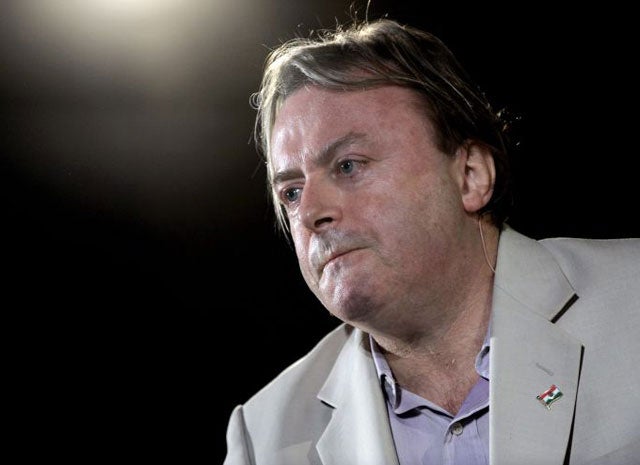The Independent's journalism is supported by our readers. When you purchase through links on our site, we may earn commission.
It's time to give Christopher Hitchens a statue
The great essayist's opinions in later life were more solid than critics allow. But they shouldn't matter to any possible memorial

During his lifetime many of the late Christopher Hitchens’s most vociferous critics were former allies from the political left. How, it was asked, could a once radical polemicist have become a cheerleader for the neo-conservative project to remake the world? The late American author Studs Terkel probably echoed the feelings of much of the left when he described Hitchens as having been transformed from a “witty observer of the human condition to a bloody bore, seated at the far-right end of the bar”.
In death as in life Christopher Hitchens continues to court controversy. An online petition to erect a statue to the former contrarian in Red Lion Square, Holborn, supported by the British Humanist Association (BHA), is being vociferously opposed by local Labour councillors, one of whom has unflatteringly described the late Hitchens as a “pro-war islamophobe”.
“Gift of prose doesn't excuse support for illegal wars and the destruction of Muslims”, Holborn councillor Awale Olad wrote on Twitter.
Those of us who admired Christopher Hitchens are already familiar with this sort of thing. Based on the stance he took on the wars in Afghanistan and Iraq, during the last decade of his life Christopher Hitchens’s name was often prefaced with disclaimers like “formerly of the left” and “neo-conservative”. Unflinching support for the overthrow of dictatorship supposedly meant that Hitchens had jettisoned the left-wing principles of his youth and metamorphasised “from a butterfly into a slug”, as the Respect MP George Galloway put it.
To be fair to Hitchens’s critics, the human cost of the war in Iraq has been so high that it’s right to expect a degree of contrition from those who supported it, not to mention from those who misled Parliament in the lead up to the war. Iraqis now have a political system that is much more democratic (not to mention much less dangerous) than anything that existed under Saddam Hussein, but the cost of getting there has been nothing less than a bloodbath.
Despite the smug certainties of the anti-war crowd, however – you may have noticed that they have very little to say on the 30,000 people killed in Syria - the real question in 2003 was whether or not war would be less bad than the continuation of a criminal totalitarian state where genocide, torture, mass graves and an all-pervasive security apparatus formed the backdrop to everyday life. Hitchens took the position that it would; and therefore reducing his entire political output to the words “pro-war” makes about as much sense as describing anyone who opposed the war as pro-Saddam – and it shouldn’t be forgotten that some were of course.
Those who misrepresent the views of Christopher Hitchens may also wish to consider the words of one of the characters in Ian McEwan’s Iraq war protest book Saturday. Discussing with his daughter the potential benefits of coalition forces entering Iraq, Dr Henry Perowne hedges a bet that the chance to turn one country in the Middle East around may “plant a seed” which spreads across the region.
“My fifty pounds says three months after the invasion there’ll be a free press in Iraq, and unmonitored internet access too. The reformers in Iran will be encouraged, those Syrian and Saudi and Libyan potentates will be getting the jitters.”
Since those words were written mass protests have threatened to topple the Iranian theocracy, Colonel Gadaffi is dead and the regime of Bashir al-Assad has resorted to extreme violence to retain its grip on power. It’s quite possible to have opposed the war in Iraq yet recognise that such developments may never have occurred had Saddam Hussein’s Ba’ath Party remained in power.
In contrast to the anti-war marchers of February 2003, who sang and danced in Hyde Park as they called for the prolongation of one of the world’s worst dictatorships, Hitchens confided to his close friend Martin Amis that in the period when the Iraq war was at its worst he was in a “world of pain”. And yet were he still with us, there can be little doubt that Hitchens would have recognised that the tragedy in Syria is that Western military intervention, if it does come, may happen altogether too late. As most of us learned as children in the school playground, inaction is often no better than intervention on the side of the aggressor and against the victim.
It may surprise some people to learn that it’s possible to be on the left and take the opposite view to Holborn’s kitsch-left Labour councillors. For some of us, Hitchens represents a break only with those parts of the left that after 9/11 didn’t feel in any sense obliged to take responsibility or make any difficult decisions, mainly because they’d given up on ever attaining power and therefore thinking about how power might be used as a force for good in the world.
Ultimately, and in spite of this lengthy throat clearing, I would like to suggest that any decision as to whether or not it is correct to put up a statue to Christopher Hitchens should be based solely on whether or not this is an appropriate way to honour England’s greatest essayist since George Orwell.
Join our commenting forum
Join thought-provoking conversations, follow other Independent readers and see their replies
Comments
Bookmark popover
Removed from bookmarks